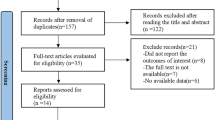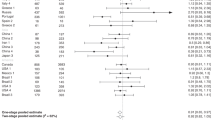Abstract
Purpose
Data from in vitro and animal studies support the preventive effect of tea (Camellia sinensis) against colorectal cancer. Further, many epidemiologic studies evaluated the association between tea consumption and colorectal cancer risk, but the results were inconsistent. We conducted a meta-analysis of prospective cohort studies to systematically assess the association between tea consumption and colorectal cancer risk.
Methods
A comprehensive literature review was conducted to identify the related articles by searching PubMed and Embase up to June, 2019. Summary relative risks (RRs) and 95% confidence intervals (CIs) were calculated using a fixed effect model.
Results
Twenty cohort articles were included in the present meta-analysis involving 2,068,137 participants and 21,437 cases. The combined RR of colorectal cancer for the highest vs. lowest tea consumption was determined to 0.97 (95% CI 0.94–1.01) with marginal heterogeneity (I2 = 24.0%, P = 0.093) among all studies. This indicated that tea consumption had no significant association with colorectal cancer risk. Stratified analysis showed that no significant differences were found in all subgroups. We further conducted the gender-specific meta-analysis for deriving a more precise estimation. No significant association was observed between tea consumption and colorectal cancer risk in male (combined RR = 0.97; 95% CI 0.90–1.04). However, tea consumption had a marginal significant inverse impact on colorectal cancer risk in female (combined RR = 0.93; 95% CI 0.86–1.00). Further, we found a stronger inverse association between tea consumption and risk of colorectal cancer among the female studies with no adjustment of coffee intake (RR: 0.90; 95% CI 0.82–1.00, P < 0.05) compared to the female studies that adjusted for coffee intake (RR = 0.97; 95% CI 0.87–1.09, P > 0.05).
Conclusions
Our finding indicates that tea consumption has no significant impact on the colorectal cancer risk in both genders combined, but gender-specific meta-analysis shows that tea consumption has a marginal significant inverse impact on colorectal cancer risk in female.




Similar content being viewed by others
References
Siegel RL, Miller KD, Fedewa SA et al (2017) (2017) Colorectal cancer statistics. Cancer J Clin 67(3):177–193
Arnold M, Sierra MS, Laversanne M, Soerjomataram I, Jemal A, Bray F (2017) Global patterns and trends in colorectal cancer incidence and mortality. Gut 66(4):683–691
Bray F, Ferlay J, Soerjomataram I, Siegel RL, Torre LA, Jemal A (2018) Global cancer statistics 2018: GLOBOCAN estimates of incidence and mortality worldwide for 36 cancers in 185 countries. Cancer J Clin 68(6):394–424
Li XY, Yu CQ, Guo Y et al (2019) Association between tea consumption and risk of cancer: a prospective cohort study of 0.5 million Chinese adults. Eur J Epidemiol 34(8):753–763
Zhu MZ, Wen BB, Wu H et al (2019) The quality control of tea by near-infrared reflectance (NIR) spectroscopy and chemometrics. J Spectrosc. https://doi.org/10.1155/2019/8129648
Zhu MZ, Li N, Zhao M, Yu WL, Wu JL (2017) Metabolomic profiling delineate taste qualities of tea leaf pubescence. Food Res Int 94:36–44
Yang CS, Maliakal P, Meng XF (2002) Inhibition of carcinogenesis by tea. Annu Rev Pharmacol 42:25–54
Nakagawa K, Miyazawa T (1997) Chemiluminescence high-performance liquid chromatographic determination of tea catechin, (-)-epigallocatechin 3-gallate, at picomole levels in rat and human plasma. Anal Biochem 248(1):41–49
Gan RY, Li HB, Sui ZQ, Corke H (2018) Absorption, metabolism, anti-cancer effect and molecular targets of epigallocatechin gallate (EGCG): an updated review. Crit Rev Food Sci 58(6):924–941
Yang G, Zheng W, Xiang YB et al (2011) Green tea consumption and colorectal cancer risk: a report from the Shanghai Men's Health Study. Carcinogenesis 32(11):1684–1688
Su LJ, Arab L (2002) Tea consumption and the reduced risk of colon cancer—results from a national prospective cohort study. Public Health Nutr 5(3):419–425
Dominianni C, Huang WY, Berndt S, Hayes RB, Ahn J (2013) Prospective study of the relationship between coffee and tea with colorectal cancer risk: the PLCO Cancer Screening Trial. Br J Cancer 109(5):1352–1359
Sinha R, Cross AJ, Daniel CR et al (2012) Caffeinated and decaffeinated coffee and tea intakes and risk of colorectal cancer in a large prospective study. Am J Clin Nutr 96(2):374–381
Sun CL, Yuan JM, Koh WP, Yu MC (2006) Green tea, black tea and colorectal cancer risk: a meta-analysis of epidemiologic studies. Carcinogenesis 27(7):1301–1309
Wang XJ, Zeng XT, Duan XL, Zeng HC, Shen R, Zhou P (2012) Association between green tea and colorectal cancer risk: a meta-analysis of 13 case-control studies. Asian Pac J Cancer Prev 13(7):3123–3127
Wang ZH, Gao QY, Fang JY (2012) Green tea and incidence of colorectal cancer: evidence from prospective cohort studies. Nutr Cancer 64(8):1143–1152
Chen YT, Wu Y, Du ML et al (2017) An inverse association between tea consumption and colorectal cancer risk. Oncotarget 8(23):37367–37376
Wada K, Oba S, Tsuji M et al (2019) Green tea intake and colorectal cancer risk in Japan: the Takayama study. Jpn J Clin Oncol 49(6):515–520
Stang A (2010) Critical evaluation of the Newcastle–Ottawa scale for the assessment of the quality of nonrandomized studies in meta-analyses. Eur J Epidemiol 25(9):603–605
Duan P, Hu CH, Quan C et al (2015) Body mass index and risk of lung cancer: systematic review and dose-response meta-analysis. Sci Rep Uk. https://doi.org/10.1038/srep16938
Higgins JPT, Thompson SG, Deeks JJ, Altman DG (2003) Measuring inconsistency in meta-analyses. Br Med J 327(7414):557–560
Haghighatdoost F, Nobakht BF, Hariri M (2018) Effect of green tea on plasma leptin and ghrelin levels: a systematic review and meta-analysis of randomized controlled clinical trials. Nutrition 45:17–23
Goldbohm RA, Hertog MGL, Brants HAM, vanPoppel G, vandenBrandt PA (1996) Consumption of black tea and cancer risk: a prospective cohort study. J Natl Cancer Inst 88(2):93–100
Zheng W, Doyle TJ, Kushi LH, Sellers TA, Hong CP, Folsom AR (1996) Tea consumption and cancer incidence in a prospective cohort study of postmenopausal women. Am J Epidemiol 144(2):175–182
Hartman TJ, Tangrea JA, Pietinen P et al (1998) Tea and coffee consumption and risk of colon and rectal cancer in middle-aged Finnish men. Nutr Cancer 31(1):41–48
Terry P, Wolk A (2001) Tea consumption and the risk of colorectal cancer in Sweden. Nutr Cancer 39(2):176–179
Nagano J, Kono S, Preston DL, Mabuchi K (2001) A prospective study of green tea consumption and cancer incidence, Hiroshima and Nagasaki (Japan). Cancer Cause Control 12(6):501–508
Michels KB, Willett WC, Fuchs CS, Giovannucci E (2005) Coffee, tea, and caffeine consumption and incidence of colon and rectal cancer. J Natl Cancer Inst 97(4):282–292
Suzuki Y, Tsubono Y, Nakaya N et al (2005) Green tea and the risk of colorectal cancer: pooled analysis of two prospective studies in Japan. J Epidemiol 15(4):118–124
Oba S, Shimizu N, Nagata C et al (2006) The relationship between the consumption of meat, fat, and coffee and the risk of colon cancer: a prospective study in Japan. Cancer Lett 244(2):260–267
Sun CL, Yuan JM, Koh WP, Lee HP, Yu MC (2007) Green tea and black tea consumption in relation to colorectal cancer risk: the Singapore Chinese Health Study. Carcinogenesis 28(10):2143–2148
Yang G, Shu XO, Li HL et al (2007) Prospective cohort study of green tea consumption and colorectal cancer risk in women. Cancer Epidemiol Biomark Prev 16(6):1219–1223
Lee KJ, Inoue M, Otani T, Iwasaki M, Sasazuki S, Tsugane S (2007) Coffee consumption and risk of colorectal cancer in a population-based prospective cohort of Japanese men and women. Int J Cancer 121(6):1312–1318
Suzuki E, Yorifuji T, Takao S et al (2009) Green tea consumption and mortality among Japanese elderly people: the prospective Shizuoka Elderly Cohort. Ann Epidemiol 19(10):732–739
Simons CCJM, Leurs LJ, Weijenberg MP, Schouten LJ, Goldbohm RA, van den Brandt PA (2010) Fluid intake and colorectal cancer risk in the Netherlands Cohort Study. Nutr Cancer 62(3):307–321
Nechuta S, Shu XO, Li HL et al (2012) Prospective cohort study of tea consumption and risk of digestive system cancers: results from the Shanghai Women's Health Study. Am J Clin Nutr 96(5):1056–1063
Goldbohm RA, VandenBrandt PA (1996) Consumption of black tea and cancer risk: a prospective cohort study—response. J Natl Cancer Inst 88(11):768–769
Yang CS, Wang H (2016) Cancer preventive activities of tea catechins. Molecules. https://doi.org/10.3390/molecules21121679
Weng H, Zeng XT, Li S, Kwong JSW, Liu TZ, Wang XH (2017) Tea consumption and risk of bladder cancer: a dose–response meta-analysis. Front Physiol. https://doi.org/10.3389/fphys.2016.00693
Funding
This research was funded by National Key R&D Program of China (Grant no. 2018YFC1604405), China Postdoctoral Science Foundation (Grant no. 2018M632962), Hunan Provincial Natural Science Foundation of China (Grant no. 2019JJ50238), Open Foundation of Hunan Provincial Key Laboratory for Germplasm Innovation and Utilization of Crop (Grant no. 18KFXM10), Natural Science Foundation of China (Grant no. 31901672), Provincial Natural Science Foundation of Anhui (Grant no. 1908085MC57), and Macau Science and Technology Development Fund (Grant no. 009/2017/A1).
Author information
Authors and Affiliations
Contributions
All authors have made substantial contributions to the conception and design of the study. MZ, DL, and FZ conducted the search and data extraction. JO, PH, BG, JT, FS, JL, XZ, YL, HL, SC, JH, JL, KW, and JW collected the data. MZ and ZL analyzed the data and wrote the manuscript.
Corresponding authors
Ethics declarations
Conflicts of interest
The authors declare no conflict of interest.
Rights and permissions
About this article
Cite this article
Zhu, Mz., Lu, Dm., Ouyang, J. et al. Tea consumption and colorectal cancer risk: a meta-analysis of prospective cohort studies. Eur J Nutr 59, 3603–3615 (2020). https://doi.org/10.1007/s00394-020-02195-3
Received:
Accepted:
Published:
Issue Date:
DOI: https://doi.org/10.1007/s00394-020-02195-3




